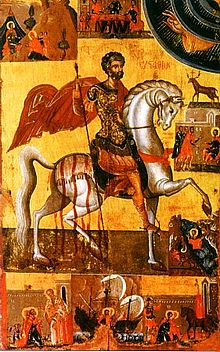Saint Eustachius
| Saint Eustace and companions | |
|---|---|

Greek Orthodox icon of St. Eustathios
|
|
| Martyrs | |
| Died | 118 AD |
| Venerated in | Anglican Church; Roman Catholic Church; Eastern Orthodox Church |
| Feast | September 20 (Western Christianity, Eastern Orthodoxy) |
| Attributes | bull; crucifix; horn; stag; oven |
| Patronage | against fire; difficult situations; fire prevention; firefighters; hunters; hunting; huntsmen; Madrid; torture victims; trappers |
Saint Eustace, also known as Eustachius or Eustathius in Latin,St. Esthak in India, or Sh. Staka in Albania, is revered as a Christian martyr and soldier saint. Legend places him in the 2nd century AD. A martyr of that name is venerated as a saint in the Anglican Church. He is commemorated by the Roman Catholic Church and the Orthodox Church on September 20.
According to legend, prior to his conversion to Christianity Eustace was a Roman general named Placidus, who served the emperor Trajan. While hunting a stag in Tivoli near Rome, Placidus saw a vision of a crucifix lodged between the stag's antlers. He was immediately converted, had himself and his family baptized, and changed his name to Eustace (Greek: Ευστάθιος (Eustáthios), "well stable", or Ευστάχιος (Eustáchios), "fruitful/rich grain").
A series of calamities followed to test his faith: his wealth was stolen; his servants died of a plague; when the family took a sea-voyage, the ship's captain kidnapped Eustace's wife Theopista; and as Eustace crossed a river with his two sons Agapius and Theopistus, the children were taken away by a wolf and a lion. Like Job, Eustace lamented but did not lose his faith.
He was then quickly restored to his former prestige and reunited with his family. There is a tradition that when he demonstrated his new faith by refusing to make a pagan sacrifice, the emperor Hadrian condemned Eustace, his wife, and his sons to be roasted to death inside a bronze statue of a bull or an ox, in the year AD 118. However, the Catholic Church rejects this story as "completely false".
The opening part of this legend, up to Eustace's martyrdom, is a variant of a popular tale in chivalric romance: "the Man Tried By Fate". Except for an exemplum in Gesta Romanorum, all such tales are highly developed romances, such as Sir Isumbras. A distant Indian origin for elements in the Eustace legend has been proposed.
...
Wikipedia
